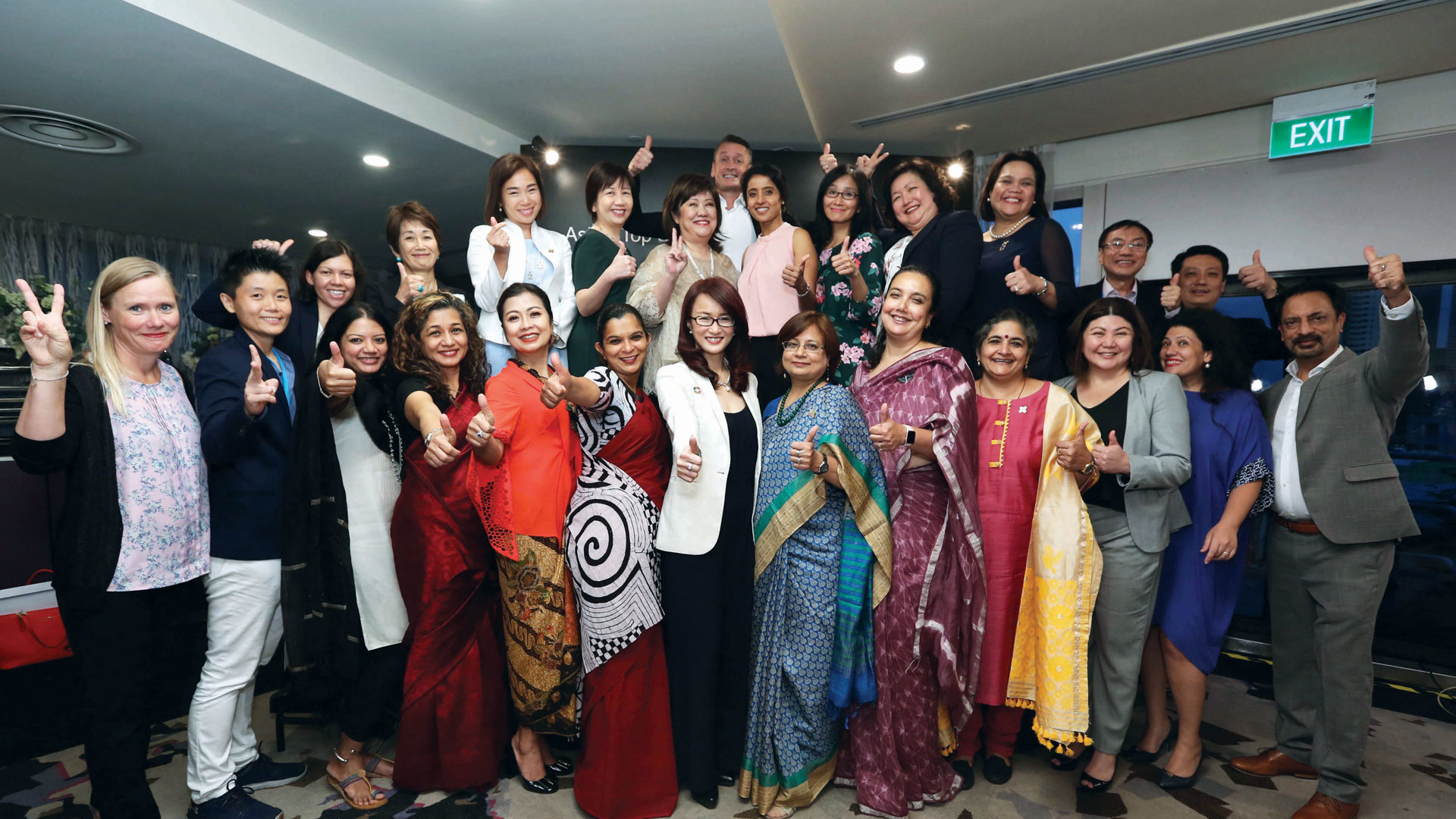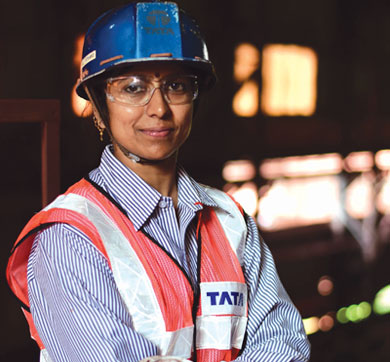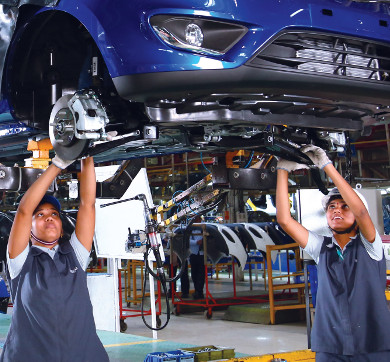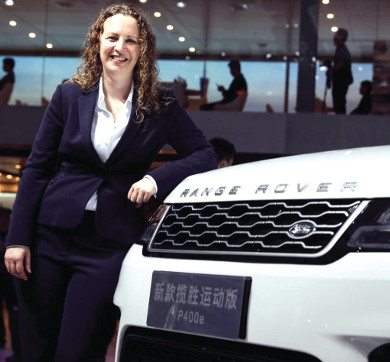March 2020 | 1391 words | 5-minute read
Chosen out of 126 nominations from 20 countries across Asia, Shalini and Madhulika are among the 27 outstanding women leaders from 11 countries who have received this coveted recognition by the Global Reporting Initiative (GRI).
In recent times, Tata Power has distinguished itself by adopting cause branding as its focus. It is this focus that has become the raison d’etre of Shalini Singh, chief of Corporate Communications and Sustainability.
A passionate advocate of social and green causes, she leads decarbonisation and circular economy initiatives at Tata Power. The social brand properties that she has driven, including Club Enerji, Greenolution, etc, have won several awards.
She says, “I handle multiple portfolios linked to sustainability. I have the opportunity to combine my passion with my work, so it doesn’t feel like work.” She is also the chief – CSR (corporate social responsibility), CEO and managing trustee of Tata Power Community Development Trust and chief – Tata Power Skill Development Centres.
Shalini and her teams work in five thrust areas of education, health and sanitation, financial inclusivity, water and cultivation, and employability and livelihood. Says Shalini, “Last year, we touched the lives of 2.2 million people.”
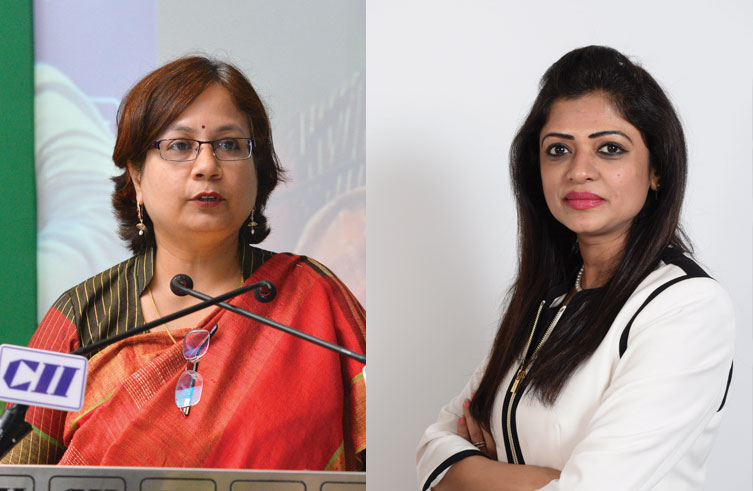
Conserving energy
The team’s earliest foray into cause branding was Tata Power Club Energy, subsequently renamed Club Enerji. Based on the simple idea that energy saved is energy produced, and that energy could easily be saved if the right action was taken. The programme went on to sensitise 26 million citizens and 15 lakh children in 533 schools in 12 cities with its message of energy conservation. Today Club Enerji is a self-sustaining movement that has taken on a life of its own.
Shalini says, “After driving home the message of energy conservation, we linked the programme to fuel and water consumption, waste management, etc, successfully creating a conservation mindset among children and their families.”
Protecting the mahseer
The company was just as keen on the conservation of the Mahseer fish. Shalini says, “For the past 40 years, we have been maintaining a hatchery in Lonavala where the fingerlings are grown, before they are released in the lake around the company’s own Walwhan dam.”
Tata Power invited the masses to convert this programme into a movement. The programme invited people to sign up as fish knights and volunteer to create awareness of the mahseer’s role in cleaning the marine ecosystem, as the mahseer is an indicator of the water body’s health.
Empowering women at the grassroot level
A common thread running through these programmes has been that of empowerment. “This brand of inspirational leadership at Tata Power has inspired and encouraged me,” says Shalini. She strives to ensure that the sustainability programmes that she steers have two elements: They should make a difference to the future, and they should go beyond business to touch the community.
One of the team’s bigger microenterprises, Dhaaga, enables women to showcase their sewing and artistic talents by facilitating skilling for garment and handicraft making. Around 1050 women across 50 locations are part of this initiative. Beginning by supplying to Okhai, the women now have their own label, Dhaaga, which will soon be available on Amazon Saheli, a portal for women entrepreneurs. The other is called Maval Dairy programme, an all-women’s dairy, which is run as a business unit and promotes its dairy products through an app that is operated by the women themselves.
To keep all these initiatives going, Shalini depends on four teams — whom she describes as “team players who are empowered”. They work in different spheres, but in tandem on the initiatives. “What ties many things together for us is that we are process oriented, focused on effective planning and deployment, and open to feedback, which enables us to handle multiple portfolios with ease.”
“I am passionate about all these programmes and feel extremely satisfied every time we cross a milestone,” she says.
Madhulika Sharma, chief sustainability officer (CSO), Tata Steel, has held several senior-level roles in India’s largest steel maker in her over two-and-a-half-decade-long career.
Before taking on the role of CSO in July 2016, she was chief of Infrastructure Planning and Development for Tata Steel’s Jamshedpur plant. During this tenure, she made many visible changes inside the steel works at Jamshedpur, including doubling of green cover between 2012 and 2016.
Setting up infrastructure
“The plant had just completed the three-million-tonne expansion, but the other infrastructure was not ready. I was brought in to envision that infrastructure and work towards its creation,” says Madhulika. It was uncharted territory; besides, funding was a constraint for a task that required capital expenditure which had zero returns on investment.
Harking back to how the Founder had envisaged the creation of Jamshedpur, Madhulika considered the issue from a social and humane perspective. Over the next few months, the infrastructure slowly came into being. It included modern offices, amenities for contract workforce, better infrastructure for road safety like parking space, bus stands, modern signage, etc. Madhulika mooted the ideas and sought acceptance for them, working with the Amenities committee, headed by the VP of Human Resources. She says, “I worked with a good team who understood my ideas and helped bring them to fruition.” Of all the projects that she has worked on, this is the one that brings Madhulika the most satisfaction.
Another project that she is very proud of was her work with the Diversity and Inclusion programme of Tata Steel, especially for promoting gender diversity. She is the founder member of the first women network forum in Tata Steel called SWATI (Steel Women Aspirational Team Initiative). As part of this network, she had initiated the idea that women be allowed to work in at least two shifts on the shop floor.
Working sustainably
In her current role as corporate sustainability officer, Madhulika is responsible for embedding sustainability initiatives across all functions of Tata Steel India and for monitoring and reporting the progress on these initiatives. She says, “I also ensure that we comply with the disclosures related to our material issues through our annual reports and other disclosure frameworks. Sustainability has a social, environmental and economic component, and there are several disclosures, public and internal, that need to be made.”
Madhulika has been instrumental in propagating sustainability-related values of the organisation to internal and external stakeholders, including supply chain partners, subsidiaries and profit centres, creating cross-functional forums involving senior management and functional leaders, and forming a network of sustainability champions who are ambassadors of sustainability in their functions.
Madhulika works with a very small core team; it’s the larger network that comes to her rescue. She says, “I have a network of about 150 sustainability champions across the organisation. They serve as my extended arms.” She has been the co-chair for the Sustainability Committee of Confederation of Indian Industry (CII) eastern region. She is also a lead assessor for CII-ITC Sustainability Awards, and the assessing team which she led in 2015 was adjudged the best assessor team.
Madhulika is also the chairperson of the Diversity Council at Jamshedpur. She is also on the internal complaints committee of POSH (prevention of sexual harassment). Despite her busy schedule, she also takes time out to mentor younger women and to remind them to create their own ecosystem of support.
“The recognition of Madhulika as one of Asia’s Top Sustainability Superwomen is a perfectly well-deserved one. As chief of corporate sustainability, Madhulika’s work is vital to what Tata Steel has achieved so far, which is to bring in a humane dimension to our corporate goals that ensure growth and sustainability go perfectly together. On behalf of everyone at Tata Steel, I congratulate her on this remarkable feat and shall continue to support her work in the coming years,” said Sanjiv Paul, VP (safety, health and sustainability), Tata Steel.
“This is a recognition that I wish to share with all my colleagues in Tata Steel for their generous support through all these years as we worked as a team to achieve our sustainability goals. By the very nature of the business we are in, sustainability can be both challenging and immensely rewarding, both at a personal level and at the team lead level. I must also thank GRI for this encouragement that I hope and intend to live up to,” says Madhulika.
—Cynthia Rodrigues




